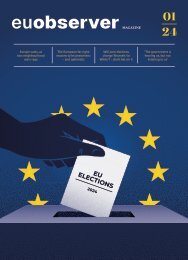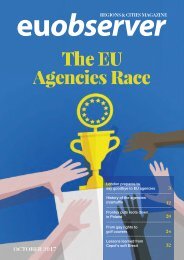Health in a post-pandemic EU
As this magazine goes to press, the World Health Organisation has registered just shy of seven million global deaths due to COVID-19. It also has registered over 13.5 billion doses of vaccines administered. When it comes to health, it’s truly an extraordinary period to be alive. And to stay alive, if all works out as it seems to be doing.
As this magazine goes to press, the World Health Organisation has registered just shy of seven million global deaths due to COVID-19. It also has registered over 13.5 billion doses of vaccines administered. When it comes to health, it’s truly an extraordinary period to be alive. And to stay alive, if all works out as it seems to be doing.
You also want an ePaper? Increase the reach of your titles
YUMPU automatically turns print PDFs into web optimized ePapers that Google loves.
“IT’S NOT JUST ABOUT SLOGANS”<br />
HEALTH IN A POST-PANDEMIC <strong>EU</strong><br />
us to our work. In pr<strong>in</strong>ciple, our mandate<br />
stayed the same as it was before, <strong>in</strong> terms<br />
of that we are deal<strong>in</strong>g with <strong>in</strong>fectious<br />
diseases. But some of the tasks have been<br />
specified. We have new aspects of our<br />
tasks. And then there are a few new elements<br />
<strong>in</strong>, for <strong>in</strong>stance, the <strong>EU</strong> reference<br />
laboratories, the <strong>EU</strong> <strong>Health</strong> Task Force,<br />
the foresight and modell<strong>in</strong>g, we look at<br />
determ<strong>in</strong>ants prevention and health system<br />
<strong>in</strong>dicators. So there are a few new<br />
elements that have been added, as<br />
lessons learned from the <strong>pandemic</strong>.<br />
What were some key lessons learned<br />
from the <strong>pandemic</strong>?<br />
We must enhance our surveillance, and<br />
improve preparedness and risk communication.<br />
The particular emphasis now,<br />
which has been evolv<strong>in</strong>g <strong>in</strong> the past year,<br />
is the emphasis on the workforce. Every<br />
country has experienced the same scene<br />
– that the health workforce has massive<br />
issues. There are people leav<strong>in</strong>g the service<br />
due to burnout, and we have the<br />
loom<strong>in</strong>g crisis of people go<strong>in</strong>g to retire<br />
<strong>in</strong> the next five to 10 years, without sufficient<br />
supply <strong>in</strong> the pipel<strong>in</strong>e.<br />
That is verg<strong>in</strong>g on labour communication,<br />
or maybe workforce policy, rather<br />
than <strong>in</strong>fectious diseases.<br />
Exactly. That is where our mandate and<br />
our <strong>in</strong>fluence is limited. Of course we<br />
can advocate, and that’s what I’m also<br />
do<strong>in</strong>g. But <strong>in</strong> the end, the real turn<strong>in</strong>g<br />
of the tide can only be done with policy<br />
changes <strong>in</strong> the countries that we cannot<br />
do ourselves. Although we can of course<br />
provide tra<strong>in</strong><strong>in</strong>g for people that would<br />
like to be specialised <strong>in</strong> public health. But<br />
we cannot, you know, change the salary<br />
structure, the career perspective, the<br />
work<strong>in</strong>g conditions, that is someth<strong>in</strong>g<br />
that has to happen <strong>in</strong> the national systems.<br />
That must be frustrat<strong>in</strong>g to see.<br />
Well, when you come to work for an<br />
agency like this, you know where the<br />
remits of the mandate lie. And then you<br />
The<br />
particular<br />
emphasis<br />
now, which<br />
has been<br />
evolv<strong>in</strong>g<br />
<strong>in</strong> the past<br />
year, is the<br />
emphasis<br />
on the<br />
workforce.”<br />
Andrea Ammon<br />
have to work with<strong>in</strong> these remits and see<br />
how you can advocate for anyth<strong>in</strong>g that<br />
you f<strong>in</strong>d important for the mandate.<br />
That’s really <strong>in</strong>terest<strong>in</strong>g. The <strong>pandemic</strong><br />
has shown that the remit of the ECDC<br />
expands quite a bit beyond the gather<strong>in</strong>g<br />
of relevant data and the coord<strong>in</strong>at<strong>in</strong>g<br />
and communication of responses to<br />
that data. So for example, on <strong>in</strong>fectious<br />
diseases, <strong>in</strong>to the realm of communication<br />
– the more ‘soft’ science of br<strong>in</strong>g<strong>in</strong>g<br />
across a certa<strong>in</strong> scientific message<br />
or a way to evaluate risk for both public<br />
health officials but also for citizens. Has<br />
that changed the organisation a lot?<br />
It has brought some changes, yes, especially<br />
<strong>in</strong> the way we do our work, not so<br />
much <strong>in</strong> the substance that we are deal<strong>in</strong>g<br />
with. There is an article on communication<br />
<strong>in</strong> the new Found<strong>in</strong>g Regulation<br />
that has actually not changed.<br />
However, there are other elements <strong>in</strong><br />
the regulation, which <strong>in</strong>fluenced the<br />
communication. For <strong>in</strong>stance, that our<br />
mission statement has been expanded<br />
not only that we identify, analyse and<br />
communicate threats to human health<br />
from <strong>in</strong>fectious diseases, but we also<br />
make reports thereof available and easily<br />
accessible.<br />
This ‘accessible’ doesn’t mean that we<br />
put it free of charge on the website, but<br />
that they’re also formulated <strong>in</strong> a language<br />
that politicians and policymakers understand.<br />
So here we have to change our<br />
communication.<br />
We are a scientific organisation, and we<br />
have our scientific reports, but we have<br />
to now add a summary with key messages<br />
for public health decision makers,<br />
so that they can be used to actually implement<br />
and apply <strong>in</strong> public policy and<br />
practice.<br />
Right. So messages like, for example,<br />
like ‘flatten<strong>in</strong>g the curve’, which were<br />
successful, but I th<strong>in</strong>k maybe the communication<br />
around mask<strong>in</strong>g which was<br />
slightly less successful.<br />
Well, I th<strong>in</strong>k we have positive and negative<br />
examples <strong>in</strong> abundance over the<br />
three years. I th<strong>in</strong>k it’s not about slogans<br />
only. It’s really about expla<strong>in</strong><strong>in</strong>g. And<br />
that is why, when you have seen our<br />
lessons learned document, one of these<br />
four lessons that we put forward is Risk<br />
Communication and Community Engagement.<br />
And I th<strong>in</strong>k this community engagement<br />
was someth<strong>in</strong>g that really did not<br />
work very well <strong>in</strong> most places. People at<br />
one po<strong>in</strong>t dur<strong>in</strong>g the <strong>pandemic</strong> had not<br />
understood why they still had to wear<br />
masks, stay at home, keep that distance,<br />
get tested, and so forth.<br />
That is where I th<strong>in</strong>k our messag<strong>in</strong>g<br />
should help. It should help local politicians<br />
expla<strong>in</strong> this to the general population,<br />
but also then to specific populations,<br />
like young people, for <strong>in</strong>stance.<br />
What do you base best practices on? Is<br />
there actually a lot of science around<br />
effective communication dur<strong>in</strong>g public<br />
health crises and community engagement?<br />
Is there someth<strong>in</strong>g that you can<br />
fall back on?<br />
Yes, there is. And that’s the <strong>in</strong>terest<strong>in</strong>g<br />
part, that the fact that it hasn’t been used<br />
to its full potential is not because there<br />
is no science beh<strong>in</strong>d it – there is science.<br />
But these scientists were not necessarily<br />
part of the crisis groups. More and more<br />
countries have recognised that social scientists,<br />
risk communicators, ethicists,<br />
behavioural <strong>in</strong>sight specialists, should<br />
be part of the crisis team. And we have<br />
also now assembled a small team here at<br />
ECDC that deals specifically with that.<br />
Risk communication is a very difficult<br />
th<strong>in</strong>g to do I can imag<strong>in</strong>e. Risk is<br />
dependent on a lot of variables, and<br />
br<strong>in</strong>g<strong>in</strong>g across a complex message is<br />
very challeng<strong>in</strong>g for the general public<br />
to understand. So for example, I didn’t<br />
know the risks for someone over eighty<br />
when vacc<strong>in</strong>ated are vastly different<br />
from those for a person over 60 who is<br />
also vacc<strong>in</strong>ated. I th<strong>in</strong>k that tailor<strong>in</strong>g<br />
specific messages like that must be very<br />
complicated.<br />
Yeah, and I th<strong>in</strong>k that the risk communication<br />
has to evolve dur<strong>in</strong>g the course<br />
of such a crisis, but it’s important that it<br />
starts at the beg<strong>in</strong>n<strong>in</strong>g with clarifications<br />
that everybody can understand.<br />
At the beg<strong>in</strong>n<strong>in</strong>g of the <strong>pandemic</strong>, these<br />
differentiations weren’t even possible,<br />
because we didn’t know about all the different<br />
risks to different people.<br />
And that, I th<strong>in</strong>k, has to be very clearly<br />
said at the beg<strong>in</strong>n<strong>in</strong>g. What is known,<br />
what is not known, where there is evidence<br />
and where there are decisions<br />
based on analogy with similar <strong>in</strong>fections.<br />
I th<strong>in</strong>k people can understand that there<br />
is an evolv<strong>in</strong>g situation, so that the fact<br />
that one day, they hear one message, and<br />
the next day someth<strong>in</strong>g else, is not necessarily<br />
<strong>in</strong>terpreted as ‘they don’t know<br />
what they’re do<strong>in</strong>g.’<br />
That touches on someth<strong>in</strong>g else as well,<br />
because up to now, we’re talk<strong>in</strong>g about<br />
proactive communication based on evidence.<br />
But another phenomenon that<br />
the <strong>pandemic</strong> showed was that the importance<br />
of reactive communication to<br />
counter explicit mis<strong>in</strong>formation is also<br />
a huge part of public health communication.<br />
That is true, part of this risk communication<br />
is also health education, <strong>in</strong> which<br />
the basics are expla<strong>in</strong>ed to the population.<br />
In general, if we could <strong>in</strong>crease the<br />
health literacy of the public, then mis<strong>in</strong>formation<br />
would have a bit of a harder<br />
time gett<strong>in</strong>g through. But that is of<br />
course, not someth<strong>in</strong>g that you can do <strong>in</strong><br />
a crisis, that is someth<strong>in</strong>g that needs to<br />
be built <strong>in</strong>to the preparedness.<br />
My background was <strong>in</strong> science journalism.<br />
And if I know one th<strong>in</strong>g, it’s that<br />
it’s very hard to <strong>in</strong>terest people <strong>in</strong> someth<strong>in</strong>g<br />
that is not go<strong>in</strong>g on at that moment,<br />
but that might have importance<br />
later. Is rais<strong>in</strong>g the bar for public health<br />
knowledge among the citizens part of<br />
the next <strong>pandemic</strong> preparedness plan?<br />
In my view, it should be a chapter <strong>in</strong> the<br />
<strong>pandemic</strong> preparedness plans that are<br />
now be<strong>in</strong>g looked at and reviewed. And<br />
<strong>in</strong> terms of people not be<strong>in</strong>g <strong>in</strong>terested,<br />
we have to learn a bit from advertis<strong>in</strong>g,<br />
because <strong>in</strong> the end it concerns them as<br />
persons. Moreover, we have health issues<br />
ongo<strong>in</strong>g with mosquitoes, with climate<br />
change, with West Nile virus, with <strong>in</strong>fluenza,<br />
with measles. These diseases are<br />
there, and we could use each of these as<br />
opportunities to take aspects of health<br />
to help people become more <strong>in</strong>-depth<br />
<strong>in</strong>formed.<br />
Right. What role could the media play<br />
or what could they do better?<br />
It’s not just the media of course who<br />
could do better, but it’s also from the scientist’s<br />
side. Some <strong>in</strong>itiatives have to go<br />
out <strong>in</strong>to media brief<strong>in</strong>gs, so that it’s not<br />
just a sensational story to report, but also<br />
to help <strong>in</strong>form the media so that they<br />
know where certa<strong>in</strong> pieces of <strong>in</strong>formation<br />
fall <strong>in</strong>to.<br />
I th<strong>in</strong>k this is someth<strong>in</strong>g that we probably<br />
will not succeed one hundred percent.<br />
But you have to try your best and<br />
see what could reasonably be done to put<br />
out trustworthy <strong>in</strong>formation. Even when<br />
there is weak evidence there, so that<br />
people know that we are not fabricat<strong>in</strong>g<br />
th<strong>in</strong>gs. And that is a reputation that you<br />
have to build <strong>in</strong> non-crisis time, so that<br />
you can count on this <strong>in</strong> times of crisis. •<br />
About<br />
Alejandro Tauber<br />
Alejandro Tauber is publisher of<br />
<strong>EU</strong>observer, and previously was<br />
editor at VICE’s Motherboard, and<br />
publisher of TNW, with a background<br />
<strong>in</strong> science and tech report<strong>in</strong>g.<br />
29

















